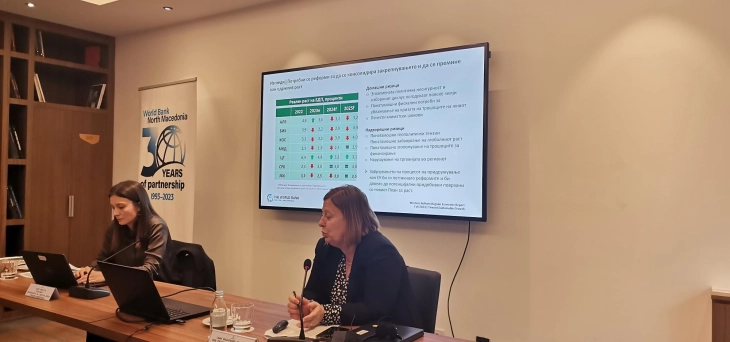WB: North Macedonia to see lowest growth and highest budget deficit in Western Balkans
- North Macedonia will see the lowest economic growth and the highest budget deficit in the Western Balkans region, says the World Bank in its semi-annual Western Balkans Regular Economic Report which was presented in Skopje on Thursday.

Skopje, 19 October 2023 (MIA) – North Macedonia will see the lowest economic growth and the highest budget deficit in the Western Balkans region, says the World Bank in its semi-annual Western Balkans Regular Economic Report which was presented in Skopje on Thursday.
The highest 2023 growth of 4.8 percent is forecast for Montenegro, followed by Albania with a growth at 3.6, Kosovo with 3.2, Bosnia and Herzegovina with 2.2, Serbia with 2. The forecasts for North Macedonia for economic growth are 1.8 percent in 2023, expected 2024 growth of 2.5 percent, and 2025 growth of 2.9 percent.
Joana Madjoska, economist at the World Bank Office in Skopje, told Thursday's press conference that economic growth in the country started decelerating in the second quarter of 2023, and after growing by 2.1 percent in Q1 2023, output increased by only 1.1 percent on an annual basis in Q2 2023.
"Growth was led by private consumption, while exports and gross capital investments fell as external demand slowed and stocks declined. Private consumption also eased compared to last year as continued high inflation and credit slowdown put a dent on household purchasing power," Madjoska said.
According to her, the measure to increase the VAT rate from 5 to 10 percent will not significantly affect inflation because it is a matter of a few products, a large part of which are not included in the inflation calculation made by the State Statistical Office.
"Inflation is slowing by the month, but in the first nine months of this year, compared to the same period last year, inflation is 11.3 percent. Our projection for the end of the year is that inflation will stand at 9.1 percent. We expect the rate to decline, but overall inflation will remain high throughout 2023. The headline inflation rate may be declining, but core inflation remains high for longer," said Madjoska.

Sanja Madzarevic-Sujster, Senior Economist for the Western Balkan countries, pointed out that unlike before when the role of external factors was the main factor for inflation in the country, now it is domestic factors, especially the growth of wages in the public sector, the lagged effects of government measures, excess demand and the large profit margin of companies.
"There were no domestic pressures on inflation until April. Since April, wages have started to increase and as such contribute to the increase in inflation. This is still not significant. However, the increase of public sector wages by 10 percent will affect the increase of the minimum wage, and thus the average wage. We expect these pressures on inflation to increase next year," Madzarevic-Sujster said, adding that it is still not possible to see when the low inflation rate that the National Bank had maintained for decades will return.
According to Madzarevic-Sujster, the increase in public sector wages and officials' wages will also contribute to the growth of inflation.
"In the past two years, North Macedonia has been the country with the highest deficit in the region. You should be aware that fiscal resources are not unlimited and should be sustainable to maintain stability. I see lights on everywhere. These are not unlimited resources and there is a cost to using them. Providing cheap energy comes at a cost and I see the impact of that reflected in the high level of deficit, well above the region's average," said Madzarevic-Sujster.
If the subsidization of the price of electricity based on fossil fuels continues instead of funding solar energy and investments in energy efficiency, she noted, the state will constantly struggle to overcome short-term challenges instead of moving in the direction of increasing long-term sustainability.
According to the World Bank, it is still too early to assess the effects of the conflict in Israel, but the conflict in its initial phase has had an impact on energy prices, especially oil, which has risen to USD 90 per barrel.
"The further trend will depend on the development of the conflict and its effect on other countries in the region," said Madjoska.
The World Bank report notes that the poverty rate in the region is declining, though at a slower pace due to high inflation.
In addition, against the background of the war in Ukraine, growth in the Western Balkans decelerated over the course of 2022 and into 2023, and the slowdown in global demand contributed to weaker-than-expected performance of industrial production in the whole EU region and in the Western Balkans, which affected Serbia and North Macedonia the most as their exports are going to advanced economies in Europe and Central Asia. The growth of tourism had a great positive impact on Albania and Montenegro, which rely on tourism as the basis of their growth.
Growth for the WB6 region is expected at 2.5 percent in 2023.
"Growth in the Western Balkan countries in 2023 is expected to slow at 2.5 percent, slightly less than what was forecast in the spring of 2023, with the possibility of a gradual recovery in the medium term. However, risks remain tilted to the downside, as a further slowdown in the EU and internal structural issues could lead to further downward revisions to forecasts. Also, the failure to bring inflation within the long-term average as planned could further hit domestic demand," said Massimiliano Paolucci, World Bank Country Manager for Kosovo and for North Macedonia.
Photo: MIA







